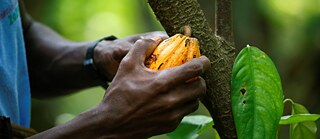Escaping Dependencies Achieving Prosperity with Organic Cocoa

Côte d’Ivoire is famous for its cocoa, which has been sold at rock-bottom prices since colonial times. The cultivation and processing of organic cocoa could show farmers the way out of poverty and dependence, as the cooperative in the village of M’Brimbo and the initiative of the Ivorian chocolate manufacturer Axel Emmanuel Gbaou demonstrate.
Côte d’Ivoire is one of the world’s most important exporters of cocoa. In colonial times under French rule, plantation workers were exploited and had to sell their goods far below producer prices. During the Vichy era, for example, white cocoa producers received twice as much for their cocoa as local farmers. Even today, cocoa farmers earn very little, so that children also work in the fields. How can this dependency harking back to colonial times between farmers and buyers, the producing industry, be eliminated?
The 47-year-old producer and mother of six expects to harvest more than a tonne of cocoa in the 2022 season, which begins in October. Béatrice Koffi Akouba is a member of the Société Coopérative Equitable du Bandama (Fair Trade Cooperative of Bandama; SCEB), founded in 2007, a pioneer of organically certified cocoa in Côte d’Ivoire and a partner of Ethiquable, a cooperative specialised in fair trade.
It’s in line with our values that producers can make a living from their hard work in this trade.
“It’s in line with our values that producers can make a living from their hard work in this trade. Today, we’re proud to have proven that it’s possible to pay a price for cocoa that ensures a good income for the plantation workers,” adds the engineer, who recently visited M’Brimbo.
“Cocoa Revolution”
“The Ivorian Chocolatier” is also a good initiative to upgrade the industry – from the production to the marketing of the chocolate – which is currently on the road to success. The start-up of the Ivorian chocolate maker Axel Emmanuel Gbaou also relies on organic quality because of its certified value: guaranteed profitability for producers based on fair trade, ethical, environmentally-friendly agriculture in a country where deforestation and climate change are reaching worrying proportions, and without child labour.Axel Emmanuel, for example, buys a tonne of beans a year from a cocoa farmer in the Agneby-Tiassa region. The trained banker gave up his profession in 2010 to start his chocolate business. Today, the Ivorian chocolatier enjoys well-deserved fame (Ivorian Excellence Award for Young Entrepreneurs 2015, Best Chocolatier at the Paris Agricultural Fair in March 2022) and prestigious orders from around the world. His chocolate bars bear the country’s various cultural identities in their embossing and packaging, and his next goal is to soon triple annual production by processing 1,500 tonnes of organic beans – an economic dynamic in the spirit of the “cocoa revolution” that will impact the production and processing chain to create better living conditions.
Organic, an Honourable Alternative, but…
The certified-organic cocoa industry is clearly an attractive economic model at present, promising and securing profitability for cocoa production in Côte d’Ivoire, in contrast to the difficulties faced by conventional cocoa farmers. The number of producers who rely on organic certification and production is steadily increasing. With 300,000 producers and just over 250,000 tonnes of cocoa produced in recent years, the sustainable cocoa industry in the country is well established. And the workers can make a decent living from it, as shown above. This is the good side of today’s chocolate industry.The vast majority of producers stick to conventional farming, with all that that entails: low incomes, destruction of forests and health hazards.
“The organic sector is clearly a remedy for the poor conditions of Ivorian cocoa farmers and for the quality of the product itself. But the ideal would be to move to the processing of the raw material to create even greater added value, which would significantly increase the income of producers,” says Pauline Zéi, director of Inades-Formation Côte d’Ivoire (a pan-African institution for fair and sustainable development). As is well known, farmers have to process their own raw material to stop the deterioration of trading conditions and escape the dependencies. The cocoa processing policy is supported by the Ivorian government, with the goal of processing 50 per cent of the nation’s production itself by as early as 2025-2030, but this is currently utopian.
In terms of improving the incomes of producers in general, something is happening. After a showdown between the countries of Côte d’Ivoire and Ghana (the two largest cocoa producers in the world with a 60 per cent share) and the big players in the chocolate industry, an agreement has just been reached to pay a premium of $400 per tonne on exports, loosely based on the fair-trade markup model. This is certainly a small, important step towards a decent income for producers, but much remains to be done to finally solve the problem of general poverty among cocoa farmers.
0 0 Comments